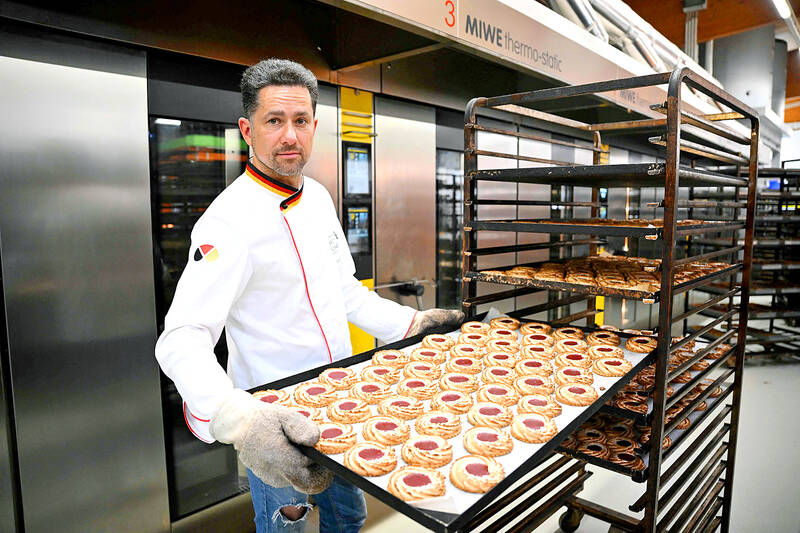Faced with exploding energy and ingredient costs, German baker Tobias Exner has installed new energy-efficient ovens, shortened his opening hours and even considered baking at lower temperatures.
However, “it just doesn’t taste the same without a good crust,” he said, adding that in any case such efforts could do little to counter the existential crisis he and other bakers are facing.
“If the conditions don’t change, then sooner or later a large share of bakeries in Germany will simply no longer exist,” Exner said.

Photo: AFP
Bakeries in Germany have been among the businesses hardest hit by the economic fallout from Russia’s invasion of Ukraine.
The war has sent energy prices spiraling across Europe, but especially in Germany, which was previously heavily dependent on Russian gas.
“Bakeries all have ovens. Seventy percent of artisanal bakeries have gas ovens, and gas prices are going through the roof,” said Friedemann Berg, managing director of the German Bakers’ Federation.
Two of the main ingredients used by bakers — flour and oil — are among those that have been affected by blockades at Ukrainian ports.
Exner’s business is relatively large with 220 staff and 36 branches in the capital and the surrounding area, leaving it better placed than many to survive the crisis — but even he is struggling.
Wheat is now 2.5 times more expensive than before the crisis, while the cost of a liter of oil has risen from about 0.82 euros (US$0.79) to more than 3 euros.
Energy bills for the business have almost quadrupled from 2020.
“You can see that the calculations no longer work,” Exner said to the hum of machines at the company’s main production site in the town of Beelitz.
However, Exner is reluctant to pass the cost increases on to his customers, who he simply believes “would not pay those kinds of prices.”
In central Berlin, the mood on the ground appears to confirm his fears.
“Even more? No way. It’s getting extortionate,” said unemployed Gloria Thomas, 56, when asked whether she would be prepared to pay more for her favorite loaf.
Many bakeries have already gone under as a result of recent cost increases, with others staging protests to demand urgent help from the German government.
There is more at stake than just bread rolls, Exner said.
“These businesses are often the most important institution in the village — they are at once grocery store, social center, post office, etc,” he said.
Early this month, about 800 German bakeries served customers in the dark for a day to draw attention to their plight.
Germany’s center-left government has announced relief measures of almost 100 billion euros to tackle inflation, but small businesses have so far been largely excluded from the help.
Worse still, they were left feeling insulted by controversial comments by German Minister for Economic Affairs and Climate Action Robert Habeck earlier this month.
Asked on a TV panel show whether he thought Germany was heading for a wave of insolvencies, Habeck replied: “I can imagine that certain industries will simply stop producing for a while.”
The comments provoked anger from bakers in particular, who accused Habeck of having no understanding of their industry.
“Habeck is probably not a stupid person, but the question is, is he qualified for the job he has right now? And I would say no,” Exner said.
The bakers’ confederation is calling for “quick and unbureaucratic” financial aid.
Bakeries can shave off costs here and there, but they “can only do so much,” Berg said.
If government help does not arrive soon, “the future looks bleak,” he said.
“It could be that many businesses have to give up their operations or simply file for bankruptcy,” he added.

BLOODSHED: North Koreans take extreme measures to avoid being taken prisoner and sometimes execute their own forces, Ukrainian President Volodymyr Zelenskiy said Ukrainian President Volodymyr Zelenskiy on Saturday said that Russian and North Korean forces sustained heavy losses in fighting in Russia’s southern Kursk region. Ukrainian and Western assessments say that about 11,000 North Korean troops are deployed in the Kursk region, where Ukrainian forces occupy swathes of territory after staging a mass cross-border incursion in August last year. In his nightly video address, Zelenskiy quoted a report from Ukrainian Commander-in-Chief Oleksandr Syrskyi as saying that the battles had taken place near the village of Makhnovka, not far from the Ukrainian border. “In battles yesterday and today near just one village, Makhnovka,

Russia and Ukraine have exchanged prisoners of war in the latest such swap that saw the release of hundreds of captives and was brokered with the help of the United Arab Emirates (UAE), officials said on Monday. Ukrainian President Volodymyr Zelenskiy said that 189 Ukrainian prisoners, including military personnel, border guards and national guards — along with two civilians — were freed. He thanked the UAE for helping negotiate the exchange. The Russian Ministry of Defense said that 150 Russian troops were freed from captivity as part of the exchange in which each side released 150 people. The reason for the discrepancy in numbers

The foreign ministers of Germany, France and Poland on Tuesday expressed concern about “the political crisis” in Georgia, two days after Mikheil Kavelashvili was formally inaugurated as president of the South Caucasus nation, cementing the ruling party’s grip in what the opposition calls a blow to the country’s EU aspirations and a victory for former imperial ruler Russia. “We strongly condemn last week’s violence against peaceful protesters, media and opposition leaders, and recall Georgian authorities’ responsibility to respect human rights and protect fundamental freedoms, including the freedom to assembly and media freedom,” the three ministers wrote in a joint statement. In reaction

BARRIER BLAME: An aviation expert questioned the location of a solid wall past the end of the runway, saying that it was ‘very bad luck for this particular airplane’ A team of US investigators, including representatives from Boeing, on Tuesday examined the site of a plane crash that killed 179 people in South Korea, while authorities were conducting safety inspections on all Boeing 737-800 aircraft operated by the country’s airlines. All but two of the 181 people aboard the Boeing 737-800 operated by South Korean budget airline Jeju Air died in Sunday’s crash. Video showed the aircraft, without its landing gear deployed, crash-landed on its belly and overshoot a runaway at Muan International Airport before it slammed into a barrier and burst into flames. The plane was seen having engine trouble.